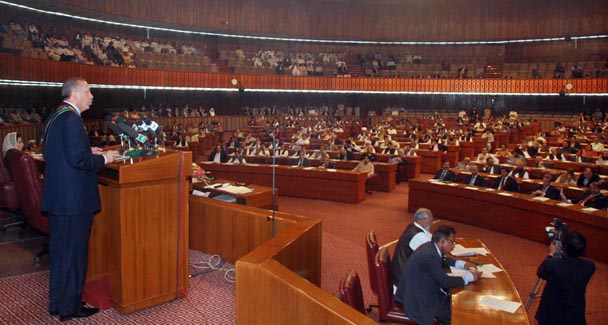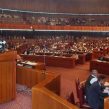
Turkey Supports Pakistan in its Fight Against Extremism
Publication: Eurasia Daily Monitor Volume: 6 Issue: 197
By:

Turkish Prime Minister Recep Tayyip Erdogan paid an official visit to Pakistan on October 25-26 in a bid to boost bilateral relations. He was accompanied by Foreign Minister Ahmet Davutoglu, and other ministers. Erdogan met with his Pakistani counterpart Yousuf Raza Gilani. They signed a number of bilateral agreements to foster cooperation in defense, commerce, mining, agriculture, education and energy. He addressed a joint session of the two houses of the Pakistani parliament, the National Assembly and the Senate. Erdogan was also decorated with the presidential medal of merit for his contributions to Turkish-Pakistani friendship (Anadolu Ajansi, October 26).
Moreover, a declaration was signed to establish a high-level enhanced cooperation council. According to Turkish press reports, this process will follow the format of high-level cooperation schemes Turkey has developed with Syria and Iraq. The prime ministers of both countries will meet at least once a year, and there will be more intensified contact at ministerial level (Cihan, October 25).
Erdogan and Gilani discussed cooperation in combating terrorism. Considering Turkey’s key role in the International Security Assistance Force (ISAF) in Afghanistan, Gilani requested help from Erdogan to strengthen NATO’s measures along the Afghan-Pakistani border to prevent cross border infiltration by militants. Moreover, Gilani expressed Pakistan’s interest in examining the Turkish religious education system. Pakistan has been criticized for its failure to reform the Madrasah, which in the view of Western observers, serves as a breeding ground for extremism. Gilani said that his government was contemplating sending a delegation to examine Turkey’s Imam Hatip religious schools, in an effort to tackle domestic extremism. In response, Erdogan told Gilani that he was the best example to represent Imam Hatip schools, noting that he was a graduate of such schools. He highlighted that students in those schools receive education according to a regular curriculum and attend some additional classes in religious instruction. Both during his joint press briefing with Gilani and his address to the Pakistani parliament, Erdogan highlighted his distaste for terrorism and fundamentalism, arguing that Islam objects to terrorism and any form of extremism (Hurriyet, October 26; Zaman, October 27).
Erdogan also addressed a joint business forum. He touched on the economic dimension of Turkish-Pakistani ties. He offered his views on the impact of the global financial crisis, reiterating his familiar argument, that thanks to his government’s successful handling of the economy, Turkey was one of the few countries least hit by the crisis. He complained about the current level of the bilateral trade volume, which remains at $750 million annually. He invited the business community to raise this to $2 billion in the next two years. They also discussed possible joint investments in Central Asia and China. As a result of the trip, Pakistan lifted visa requirements for Turkish businessmen (www.cnnturk.com, October 26).
Reflecting the humanitarian dimension in Turkish-Pakistani ties, Erdogan visited Muzaffarabad, the capital city of Kashmir, which was hit by a major earthquake in 2005. Following the devastating natural disaster, the Turkish Red Crescent and other aid organizations were the first to reach the region and deliver humanitarian relief. Likewise, Erdogan was the first foreign leader to travel to the region soon after the earthquake. The Turkish people were mobilized to assist the victims, which won the admiration of the Pakistani people. Turkey has since contributed to the reconstruction of the region’s infrastructure and helped to improve Pakistan’s disaster response capacity. Erdogan visited a housing complex and a mosque built by the Turkish Housing Administration. Similarly, the Turkish Red Crescent inaugurated a disaster coordination and logistics center in the region, which would enable a swift response to any future natural disaster and develop international relief operations (Cihan, October 26).
The trip also provided another venue for Erdogan to highlight Turkey’s recent role of peace-broker in regional conflicts and diplomatic crises. Earlier this month a suicide attack on the Iranian Revolutionary Guards, leaving several commanders dead, increased tension in the region. Iran accused Pakistan, along with the United States and Britain of supporting the perpetrators. Erdogan said that he discussed the recent bombings in Iran with Gilani and in his subsequent visit to Iran –which started today– he would further raise the issue with the Iranian president. He underlined the need to act together to ensure the regional peace and stability (Anadolu Ajansi, October 25).
Previously, Erdogan sought to play a similar mediator role when India accused Pakistan of involvement in the deadly bombing in New Delhi. Similarly, Turkey has promoted a trilateral process to help resolve disputes between Pakistan and Afghanistan (EDM, December 5, 2008).
For decades, Turks have considered Pakistan as one of the few friendly countries in the world. Turks remember the support of the Indian Muslims who later formed Pakistan in the Turkish war of independence. They also supported Pakistan’s independence and worked closely with this fellow nation in regional organizations, as well as developing close bilateral ties. The pro-Western policies followed by both Turkey and Pakistan throughout the Cold War era further helped to deepen their bilateral ties. Despite the transformation of both countries’ domestic political landscape and the drastic changes in leadership, the friendship between the two nations has remained unchanged.
The Turkish government’s recent policy of further boosting its “leadership” role in the Middle East and Central Asia provided further incentives to refocus on bilateral ties with Pakistan. As Davutoglu has frequently explained, Ankara considers ensuring the stability of the Southeast Asia as a crucial part of its own security. Therefore, Turkey has paid special attention to Pakistan and has worked tirelessly to contribute to the resolution of its problems with its neighbors (Yeni Safak, October 26). Although Ankara has proven supportive of Pakistan, there are limits to its assistance. For instance, despite Gilani’s request for support in obtaining the independence of the Indian-controlled part of Kashmir, Erdogan refused to offer any commitment, reflecting Turkey’s desire to maintain balanced relations with both India and Pakistan.




